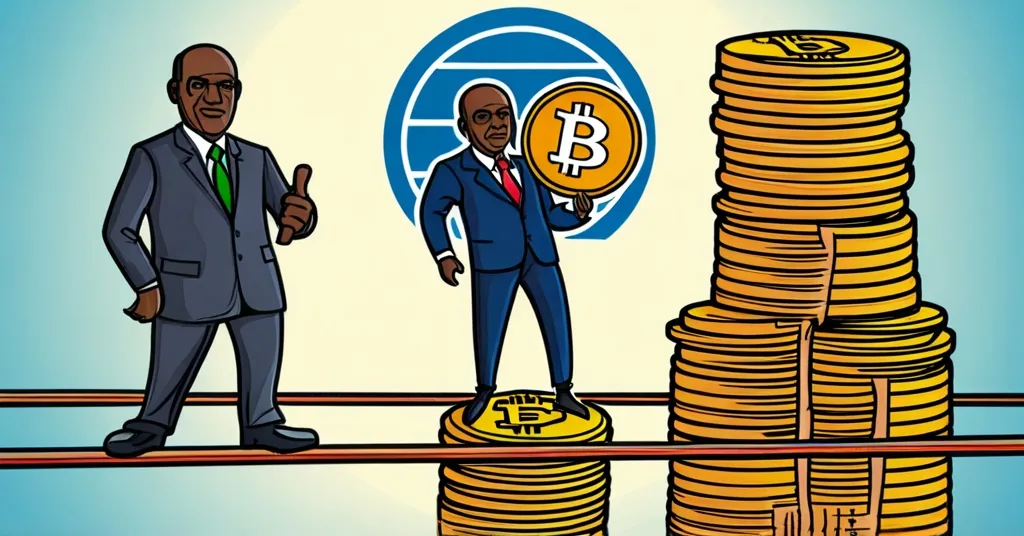El Salvador Defies IMF with Bold Bitcoin Strategy, Eyes 20,000 BTC Reserves

El Salvador’s Bold Bitcoin Bet Amid IMF Constraints
El Salvador has once again made headlines with its audacious cryptocurrency strategy, significantly ramping up Bitcoin purchases and pushing its reserves to over $574 million. This comes shortly after securing a IMF loan agreement terms with El Salvador 2023 for $1.4 billion, which ironically demands a scaled-back involvement in cryptocurrency.
- El Salvador’s Bitcoin reserves exceed $574 million following increased purchases.
- Despite IMF stipulations, President Bukele aims to acquire 20,000 more BTC.
- IMF agreement requires limiting crypto activities, but public sector transactions will remain in USD.
President Nayib Bukele, influenced by his senior Bitcoin advisor Max Keiser, appears unfazed by the IMF’s conditions. Over consecutive days last week, the nation acquired more than 11 BTC each time. Keiser has revealed that Bukele’s ambitious interim goal is to amass an additional 20,000 Bitcoin.
Max Keiser proclaims, “Bukele is ramping up Bitcoin buys with an interim goal of acquiring 20,000 more Bitcoin.”
Under the IMF loan terms, El Salvador must make Bitcoin acceptance voluntary for the private sector and curtail government involvement in the Chivo Bitcoin wallet, a state-backed digital wallet. This financial assistance aims to address fiscal challenges while managing the risks associated with Bitcoin, which the IMF regards as potentially destabilizing.
The IMF’s apprehension, however, seems to be at odds with El Salvador’s confidence in Bitcoin’s potential. Since adopting Bitcoin as legal tender in September 2021, the country has unabashedly integrated cryptocurrency into its economy, garnering both intrigue and skepticism globally.
Public sector transactions, including tax payments, will continue in US dollars to align with IMF requirements. Still, El Salvador’s strategic Bitcoin purchases may serve as a counterbalance to any negative perceptions stemming from the IMF’s restrictions. Financial analyst Eugene Epstein from Moneycorp suggests that this bold move could be a deliberate tactic to mitigate potential downsides.
President Bukele’s strategy is inherently risky, involving a tightrope walk between international financial obligations and a steadfast Bitcoin policy. The implications for El Salvador’s economic policies and international relations could be profound, marking a pivotal moment in its financial history.
Key Questions and Takeaways
- Why did El Salvador increase its Bitcoin purchases so significantly?
The government is aiming to bolster its crypto reserves and pursue an interim goal of acquiring more BTC despite external pressures. - What are the terms of El Salvador’s agreement with the IMF?
The IMF loan involves conditions to limit crypto activities, including making Bitcoin acceptance voluntary and reducing public sector involvement. - How does the IMF view El Salvador’s cryptocurrency initiatives?
The IMF views the initiatives as potentially risky, necessitating legal and regulatory adjustments to mitigate these risks. - What are President Bukele’s objectives regarding Bitcoin?
He aims to significantly increase El Salvador’s Bitcoin reserves, with a target of acquiring an additional 20,000 BTC. - How is this situation affecting El Salvador’s financial strategy?
The strategy involves balancing Bitcoin acquisition with compliance to international financial agreements, impacting their economic policies and external relations.
El Salvador’s actions highlight a broader ambition to establish itself as a leader in digital currency innovation. Hosting the “Adopting Bitcoin” conference underscores this commitment. As the world watches, El Salvador’s bold approach to cryptocurrency continues to spark debate about the future role of digital money in shaping global economies.


